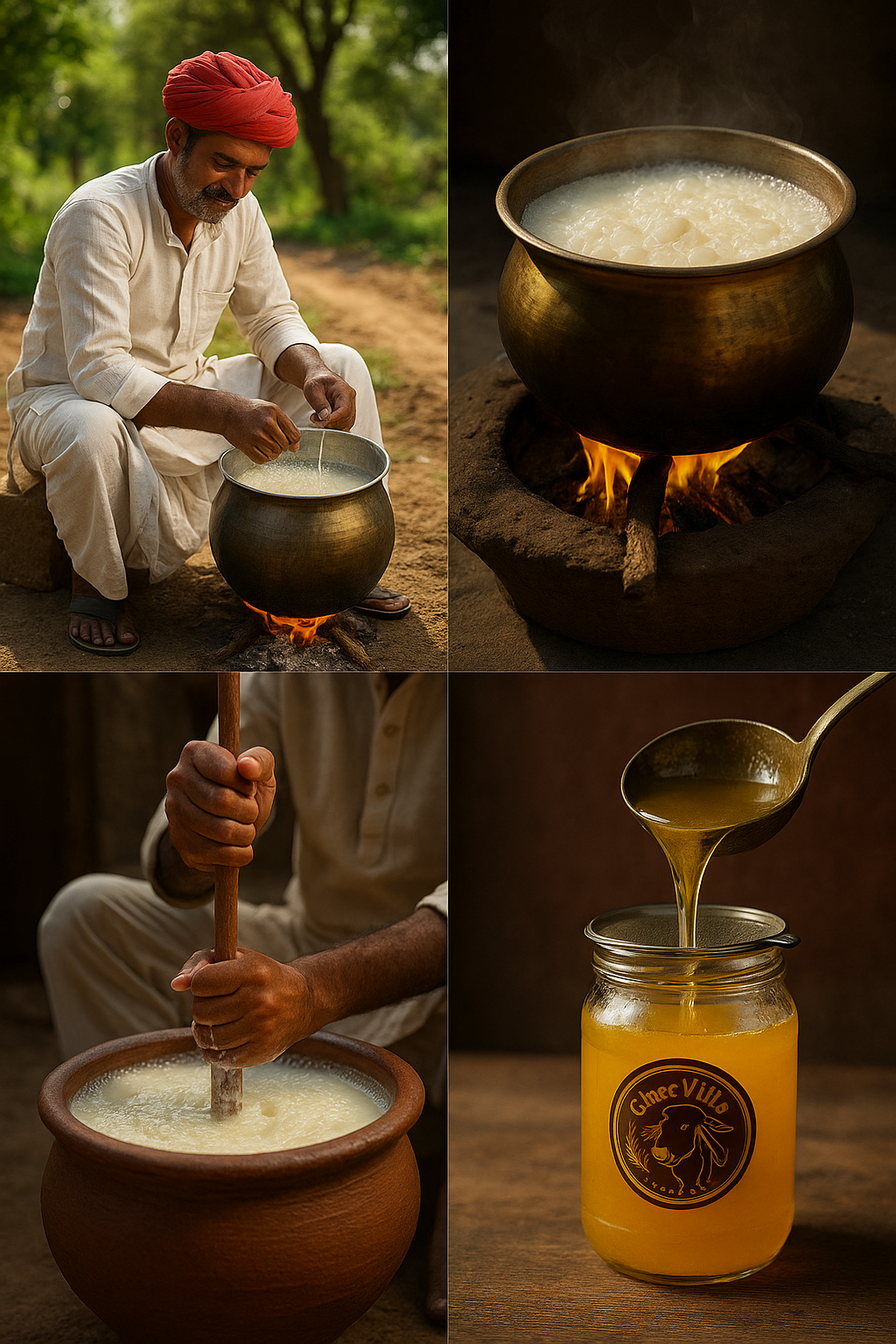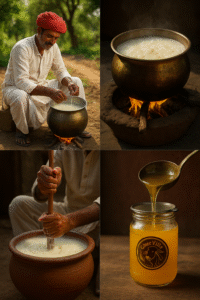Use code GHEE15 to get 15% off on your first order!
Secure Payments
Better food for a better tomorrow
How Bilona Ghee is Made – Behind the Scenes from Raw Milk to Jar
-
By gheevitainternational
- No Comments
- 2 Min Read

How Bilona Ghee is Produced – A Behind-the-Scenes Journey from Raw Milk to Jar
Introduction
Bilona Ghee is not merely a culinary fat—it’s a tradition, an immunity booster, and an emblem of India’s Ayurvedic past. At Ghee Vita International, under our brand Ghee Villa, we practice the ancient Bilona process with raw A2 milk from native Gir cows.
In this blog, we’re giving you a behind-the-scenes look—so you can really see how your jar of pure A2 Bilona Ghee is made with patience and purity.
Table of Contents
What Is Bilona Ghee?
Step 1: Collecting Raw Gir Cow Milk
Step 2: Boiling the Milk Naturally
Step 3: Setting Curd in Earthen Pots
Step 4: Hand-Churning with Bilona Method
Step 5: Slow-Cooking the Makkhan
Step 6: Filtering and Bottling
Why Bilona Ghee Is Different
Final Thoughts
Bilona Ghee: What is it?
Bilona Ghee is an A2 Ghee produced using a multi-step artisanal process that retains:
Nutrients
Aroma
Digestive enzymes
Ayurvedic properties
This is a slow, manual, and holistic process.
Step 1: Gathering Raw Gir Cow Milk
We start our day early by manually milking Gir cows — famous for their creamy A2 milk. No machines. No hormones.

gir cow raw milk collection for bilona ghee – how bilona ghee is made
Step 2: Boiling the Milk Naturally
The raw milk is boiled on a gentle flame in iron or brass vessels, never hurried. This kills bacteria and bio-activates the nutrients. Slow heat preserves the milk’s A2 protein.
Step 3: Setting Curd in Earthen Vessels
After cooling, we introduce natural culture and let it ferment for 6–8 hours in clay pots.
This thick, probiotic-rich curd — a crucial step for digestive benefits.
Step 4: Hand-Churning with the Bilona Technique
The curd is churned with a wooden churner (bilona) in two directions:
Clockwise
Anti-clockwise
This traditional technique separates makhan (white butter) and buttermilk.
ALT Image: wooden bilona churning curd to release makhan – traditional bilona technique
Step 5: Slow-Cooking the Makkhan
We then low-flame-cook the makhan, enabling the ghee to naturally separate.
Foam rises
Residue settles
Clear golden ghee appears
No hurry. Just purity and patience.
Step 6: Filtering and Bottling
The last step is muslin cloth-filtering the ghee and filling it into sterilized glass jars.
Every jar is:
Heat-sealed
Labeled
Ready to deliver health and heritage
Why Bilona Ghee Is Different ?
| Bilona Ghee | Regular Ghee |
|---|---|
| Made from curd | Made from cream |
| Hand-churned | Machine processed |
| Retains probiotics | Usually doesn’t |
| Slow-cooked | High-heat cooked |
| More nutrients | Often diluted |
That’s why Ayurveda suggests Bilona A2 Ghee for:
Gut health
Immunity
Joint lubrication
Mental clarity
Final Thoughts
When you purchase a jar of Ghee Villa A2 Bilona Ghee, you’re not only purchasing ghee—you’re also supporting:
Indigenous cow farming
Local artisans
Ancient health traditions
Each spoon is a sacrilege. Each drop is deserved.
Purchase 100% Traditional Gir Cow Ghee Now →Now.




